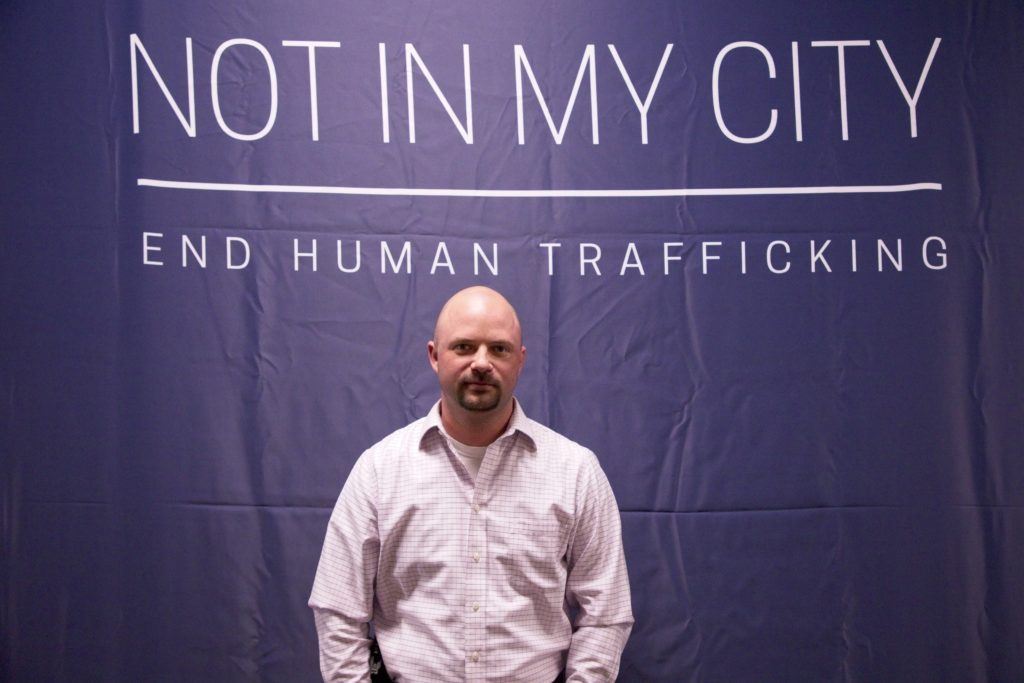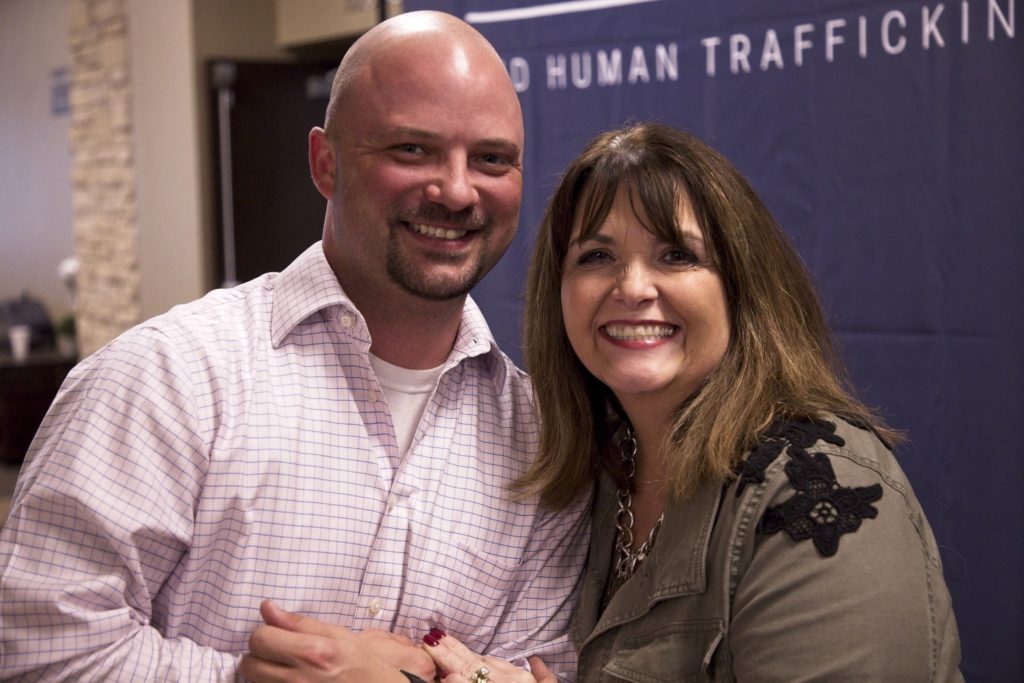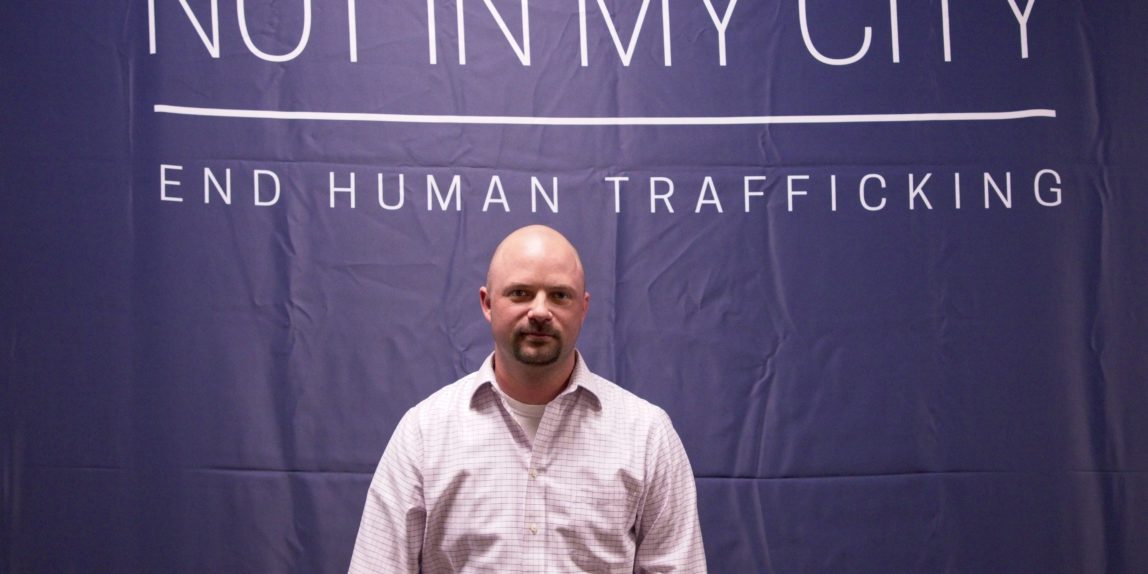Sex trafficking detective does work with national impact
Story by Corrine Moore | Photos by Aadil Sheikh | Illustration by Megan Rule
In September 2017, the International Labor Organization estimated that 24.9 million men, women, and children were victims of human trafficking around the globe. Every day, victims are coerced into the deceitful business of human trafficking and exposed to life long trauma as a result of sexual, domestic and emotional abuse from their perpetrator.
Joe Scaramucci, Detective of Human Trafficking at McLennan County Sherrif’s Office, has been working with victims of sex trafficking since 2008. At the start of his career, he worked as a campus security guard at McLennan Community College. After attending up to 3,000 hours of investigating school, he worked as a detective for death and sex crimes ranging from homicide, suicide and suspicious deaths to child and adult crimes.
Since initiating investigations in human trafficking in 2014, Scaramucci has arrested over 450 sex buyers and conducted sting operations resulting in the arrest of approximately 120 individuals for human trafficking.

He also consults law enforcement agencies throughout the U.S about these sex trafficking operations and hopes to make a national impact about how to prevent this ever-increasing epidemic.
On a typical morning, Scaramucci begins his day by searching for prostitution ads on line – scanning for clear signs that could point to sex trafficking.
Once he finds a potential victim, he begins building their case file. He then runs the victim’s number against the system the detectives use, which will show him the exact number of ads placed under that number.
“So, if I take your phone number and you’ve only placed one ad, it will just show that one ad. But if you’ve been posting ads for years traveling the country, it’s going to show me a map of every ad you’ve placed. If I see you’re in 25 different states, and you’re sending money on a weekly basis to one particular person who has to show an ID to get that money, that tells me who I’m looking for. Once I establish that there’s a pattern of travel, that screams that there’s human trafficking involved,” Scaramucci said.

The rest of Scaramucci’s day often consists of following up on other cases, subpoenas, search warrants, locating victims and actively working to set up a sting operation on the ads he believes might allude to sex trafficking. To catch the perpetrator, Scaramucci will then pose as a sex buyer and send a text to the girl posting the ads. Once they set up a time and a place to meet, Scaramucci is able to get in contact with her perpetrator.
“For example, they might text me to meet them outside Motel 6,” Scaramucci explained. “I will show up in my undercover car and regular clothes to pose as a sex buyer. Oftentimes, they will tell me to drive around to the back side of the hotel, so they can check to make sure I am not a cop. Once I get to their room number, I first try to talk to the girl, who usually stays silent out of fear, and then issue a search warrant on the perpetrator’s phone to find evidence that issues a [search] warrant.”
Oftentimes, victims are trained to stay silent in the presence of law enforcement in fear of both their perpetrator and arrest. When Scaramucci is on his way to a hotel to investigate a perpetrator, he will give Unbound a call to meet him at the set location. Unbound is a faith-based, Waco organization run by National Director Susan Peters that provides support and resources for victims to help restore their emotional, spiritual and mental health.

“Unbound’s mission is to mobilize faith based communities to activate local communities to fight human trafficking,” Peters said.
Peters was initially drawn to human trafficking prevention and awareness while traveling for missionaries across the world in places such as Uganda, India, Cambodia and Thailand. While there, the young male child soldiers spoke to her about the prevalence of human trafficking in their countries, and she felt a burden in her heart that motivated her to take action. In 2012, Peters opened the first Unbound headquarters. Now, it has spread internationally to offices in Mongolia and Cambodia.
The organization does this by focusing on three main areas – prevention awareness, professional training and survivor advocacy. They practice prevention through educating and empowering youth to spread awareness through community outreach; equip attorneys, medical professors, educators, and social service providers by conducting professional trainings teaching them how to better identify victims of human trafficking; and promote survivor advocacy through meeting the immediate needs of the victims by connecting them to aftercare programs or doctors.
“Here at Unbound, we focus heavily on prevention,” Peters said. “Just in the past year, we conducted 84 trainings and educated over 6,000 students.”
Unbound and law enforcement make a great partnership because the organization helps bridge the needs of victims while simultaneously meeting the needs of law enforcement.
“For example, if I find a girl and set her up to meet me at Motel 6, I will give Unbound a call to meet me there because I want them to contact her first in order to build up rapport and trust before introducing myself. The girls at Unbound will also provide resources to the victims to show them that there is a way out of their situation,” Scaramucci said.
The disheartening aspect of human trafficking is that often, victims are manipulated by their perpetrators into believing that the perpetrator truly loves and cares for them – similar to Stockholm syndrome or learned helplessness.
“It’s carefully planned because it’s a mind game. It’s breaking someone down mentally, and then providing for them. Once they convince the victims that they’re worthless, they condition the girls to learn to run tricks all day in return for their love and acceptance,” Scaramucci explained.
According to Scaramucci, the average age boys or girls who are sex trafficked is between 12 and 14. Out of the hundreds of young girls he’s worked with, he has yet to come across a single male. According to data from the UN, 51 percent of victims are women while another 20 percent are girls, accounting for 71 percent of total victims.
When victims escape sex trafficking, the adults enter into safe houses; houses full of other women who were involved in sex trafficking in recovery. Underage victims are sent to child protective services. According to Peters, although victims can come from any socioeconomic class, gender or race, there are certain vulnerabilities that can increase the risk.
“Victims who come from poverty or single-family homes are at a higher risk. Parents also can increase the risk by allowing children ample unmonitored social media time, and exhibit a lack of accountability for their children,” Peters said.
Peters encourages parents to have conversations with their children about the dangers of social media, such as communicating with strangers on line and sexting. Perpetrators often use social media as a tool to manipulate young children by building relationships based on false pretenses.
“If a 45-year-old man came to a family’s door and asked to speak to their 13-or 14-year-old daughter, that Mom or Dad would go berserk and shut the door in his face. Little do they know – those same people have access to their children through social media every day,” Peters said.
Scaramucci strongly stands behind the idea that law enforcement is putting the focus on the wrong people. Law enforcement isn’t focusing on traffickers – they’re focusing on the people being exploited.
“What I tell law enforcement is we can play whack-a-mole all day long. If I arrest you for prostitution, law enforcement shouldn’t immediately mark that as a win. The perpetrator is going to come and release the prostitute from prison if he doesn’t already have another girl on the line, so the cycle perpetually continues. Now, if you take him out, you not only stop that, but you stop everything else,” Scaramucci said.
Detective Scaramucci defines success for himself by stressing the importance of getting women out of the system. Obviously putting people in prison is always going to be a goal of cops, but the main goal should be helping the victims escape from their perpetrators reins, he said.
“Lets’ say you find five girl sex traffic victims but there’s not enough evidence to build a case around them, but you manage to get them out of the system—Did you succeed? Of course you did,” Scaramucci said.

A Day in the Life of Joe Scaramucci
Morning Joe Scaramucci starts each day by searching for prostitution ads on line and looking for potential victims
If a victim is found, case files are built
Afternoon Victim’s number is run against the computer system for detectives to show the exact number of ads placed under that person
Rest of the day Search warrants, subpoenas, working on previous unsolved cases, locating victims, setting up sting operations on ads found during the day
To catch a perpetrator, Scaramucci will pose as a buyer and set up a location to meet

